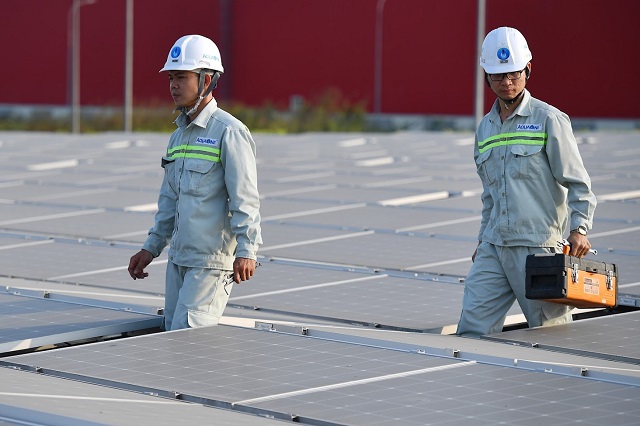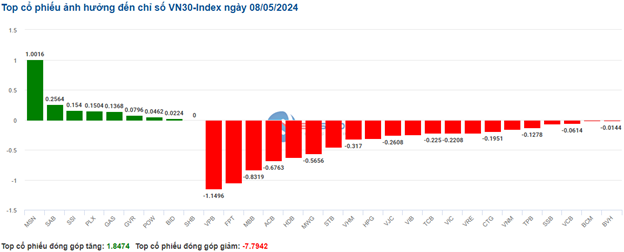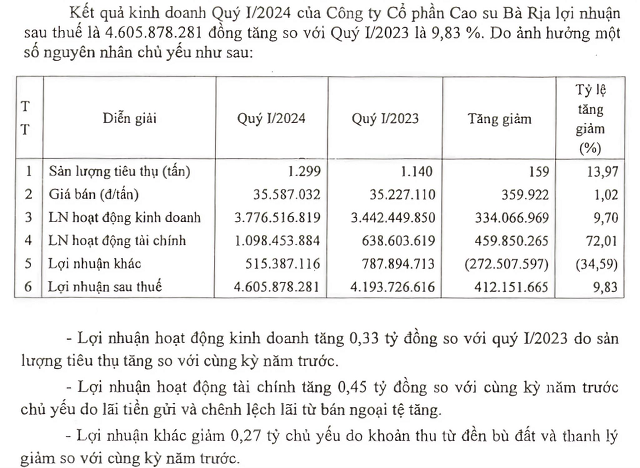Selling Electricity Will Break Planning
According to the Electricity and Renewable Energy Department, the National Power Development Plan for the 2021 – 2030 period, with a vision to 2050 (Power Plan VIII) approved by the Prime Minister in Decision No. 500/QD-TTg dated May 15, 2023 has set out the orientation for power source development and power source development plan that clearly states “Prioritizing and encouraging the development of wind power, self-produced and self-consumed solar power (including rooftop solar power of people and building roofs, solar power at production and business establishments, consumed on the spot, not connected to or not selling electricity to the national grid)”.
 Excess rooftop solar power is sent into the national power system and the power company records the electricity output at a price of 0 VND and no payment is made. Photo: Hoang Ha
|
According to the agency, the encouragement of the development of self-produced, self-consumed rooftop solar power aims to self-use, self-sufficiency for one’s own needs, reduce the purchase of electricity from the national power system, and reduce pressure on the power system. Due to the purpose of self-production and self-consumption, in order to stabilize the quality of electricity, stabilize the supply of electricity for organizations and individuals developing self-produced, self-consumed rooftop solar power, the Ministry of Industry and Trade has proposed to the Government to allow self-produced, self-consumed rooftop solar power to be connected to the national power system, exempting electricity operation licenses; construction works with rooftop solar power installed for self-production and self-consumption do not have to adjust or supplement energy land and functions according to the provisions of the law; simple implementation procedures…
“While if the development of rooftop solar power is not “self-produced and self-consumed” but for business and sales, organizations and individuals must meet the provisions of the Planning Law, Electricity Law, Investment Law, Construction Law… and a number of other specialized legal regulations,” explained the Electricity and Renewable Energy Department.
According to the Electricity and Renewable Energy Department, it is because the development of self-produced, self-consumed rooftop solar power is exempt from a number of strict regulations and criteria of the law and has many policy incentives… therefore, if electricity is sold, it will lead to a situation of breaking the national electricity plan and making it difficult to control the grid system, jeopardizing safety, and taking advantage of state policies.
“The demand for electricity sales is also a practical need in life, but people have not fully realized the benefits proposed by the Ministry of Industry and Trade in reducing pressure on the national power system, and enhancing the safe operation and electricity supply to the grid,” said the agency.
The power grid is unlikely to meet demand
The Electricity and Renewable Energy Department also cited another reason, which is that the power grid infrastructure in our country, although it has been invested in, upgraded, and gradually modernized over the years, does not mean that it can fully meet all electricity sources with different power levels. To do that, there must be storage technology, grid system dispatching and operating technology, and base power sources that can be generated in time when wind power and solar power decline.
In the case of encouraging the development of self-produced, self-consumed rooftop solar power and allowing unlimited capacity grid connection, the grid operation of the Vietnam Electricity Group will encounter many difficulties and the risk of very high national power system safety.
In fact, the operation of solar power to ensure system safety is a huge challenge, due to the instability of this form of energy. Solar power depends on solar radiation and weather factors, but these factors are uncertain. When there is no solar radiation (clouds, rain or at night), the national grid must still ensure adequate electricity supply. This leads to rapid changes and declines in the system, making the power source unstable. Meanwhile, the proportion of current power reserve is still quite low and there is no solution for synchronized electricity storage on a national scale.
“Therefore, it is necessary to have measures to limit the proportion of grid-connected solar power to ensure stable operation of the power system,” the Electricity and Renewable Energy Department assessed.
In addition, the Electricity and Renewable Energy Department said: This draft provides regulations for two types of rooftop solar power development, including grid-connected and off-grid types. The 0 VND price policy only applies to the output of “self-produced and self-consumed” rooftop solar power surplus to the national grid. The reason why self-produced, self-consumed rooftop solar power generates electricity to the national grid will cost 0 VND is because the state wants to encourage individuals and organizations to develop rooftop solar power to meet self-use demand, thereby reducing pressure on the national power system.
Finally, the agency explained the reason why Power Plan VIII limits the development of self-produced, self-consumed rooftop solar power connected to the national power system at 2,600MW. This is to ensure that the actual scale of these power sources does not exceed the approved plan, thereby avoiding overload to the distribution and transmission system. The aim is to avoid a “break” in the source and grid plan, ensuring stability and sustainability for the national power system.
In addition, Power Plan VIII also encourages the development of self-produced, self-consumed rooftop solar power, but is not allowed to sell electricity. This sets out a clear direction, focusing on using solar power for self-supplying energy to households and businesses, promoting energy saving and reducing electricity consumption from the national grid.
Luong Bang







































